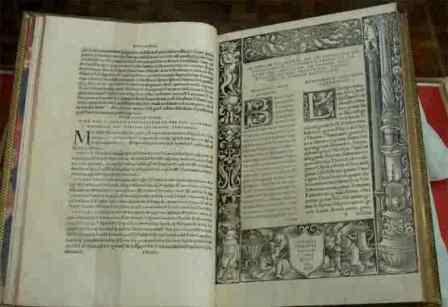|
restoring our biblical and constitutional foundations
|
Erasmus and You
After completing my doctoral dissertation and before taking my final oral exams at the University of Basel, I was given special permission to see (touch, taste, and handle!) Erasmus’ 1516 Novum Instrumentum. It sat ensconced in the library’s subbasement. After I had read a few lines of Erasmus’ work, it dawned on me just how historic this document was. I was struck dumb by God’s grace in giving this edition of the Greek New Testament to the world!

Which brings me to today’s thought. Recently I received a copy of Biblical Scholarship and the Church: A Sixteenth-Century Crisis of Authority (Ashgate 2007). Chapter 2 is entitled, “Erasmus and the Return to the Original Languages of the Scripture” (pp. 27-52). Well, I thought I should read this chapter in view of a course I hope to offer in advanced Greek grammar next spring when I return from sabbatical. This course deals not only with grammar but also with how grammar shapes our textual traditions and vice versa. In reading this chapter I realized how little I knew about Erasmus and his ground-breaking publication. You simply have to learn more about this guy!
If you can’t find the book and read the chapter yourself, here’s a brief summary. The authors make these points (among others):
- Erasmus’ motivation for publishing his Novum Instrumentum was to bring renaissance learning into the service of Christianity. (I like that: all knowledge used for the church!).
- Erasmus’ revival of Jerome’s ad fontes appeal to exegesis (i.e., let’s go back to the original languages!) was viewed as a grave threat by the church and its official teachers. Erasmus sought to free the interpretation of Scripture from the “deadening grip” (the authors’ words, not mine) of scholastic philosophy. (Amen to that! I love philosophers, but sometimes they’re too smart for their own good.)
- In particular, Erasmus’ own translation of the Latin posed a threat to the Vulgate. Scholastic theologians regarded themselves as the only properly qualified interpreters of Scripture. If the uneducated laity could have unmediated access to the Scripture, this would endanger the church’s teaching and undermine its authority. (Wow! Can you see the obvious application to today’s church, where we have become so slavishly dependent on the “pool pit” for our soul food?)
Now here’s what excited me the most about good old
Erasmus. His entire life was wrapped up with the personal study of
Scripture. For example, after leaving England he wrote to John Colet: “I
am now
 eager,
dear Colet, to approach sacred literature full sail, full gallop; I have
an extreme distaste for anything that distracts me from it, or even
delays me…. Hereafter I intend to address myself to the Scriptures and
to spend the rest of my life upon them.” Now that is one fantastic
quote! I intend to copy it and paste it on my office door.
eager,
dear Colet, to approach sacred literature full sail, full gallop; I have
an extreme distaste for anything that distracts me from it, or even
delays me…. Hereafter I intend to address myself to the Scriptures and
to spend the rest of my life upon them.” Now that is one fantastic
quote! I intend to copy it and paste it on my office door.
Again, Erasmus wrote Colet, expressing his belief that knowledge of Greek was important because “it is one thing to guess, another to judge; one thing to trust your own eyes, and another again to trust those of others.” Thus Scripture is to be the interpreted on the basis of the original languages. Yahoo!
The authors of this essay leave us with two great quotes. Read them carefully!
In taking his stand on the ultimate authority of scholarly judgement [sic] based on empirical evidence, Erasmus was calling into question the scholastic approach of allowing no ambiguity or any discussion of interpretation by those not qualified as theologians (pp. 50-51).
Erasmus’ work on the New Testament was driven by his conviction that the source of all truth was Jesus Christ, and that the primary source of Christ’s teaching was scripture (p. 51).
Now can you see why it’s so great to be a Greek teacher? The Scriptures themselves hold the key to understanding the Jesus we claim to follow. Yes, we are all “fools” and “weaklings” (1 Cor. 1:27), but that’s no excuse for biblical illiteracy!
May I suggest one incredible thing you can do with your life? Study Jesus. Study His words, not words about Him. Study His words in the original Greek if you can. I know I sound like a broken CD. I’ve being saying this stuff for over 31 years. But why take the noise of evangelical Christianity over the whisper of the Holy Spirit?
How’s this for starters? Begin a revolution in your
church by getting rid of all those glossy Sunday
 School
quarterlies (that omit huge chunks of the Bible!) and send the money
that you save to missions. Then start bringing only your Bible to
church! And that would be only the beginning.
School
quarterlies (that omit huge chunks of the Bible!) and send the money
that you save to missions. Then start bringing only your Bible to
church! And that would be only the beginning.
What I really love about Erasmus is that he was so countercultural. Not that he ever intended to question the authority of the church. He didn’t. Not that he wanted to rupture unity. No way. He was just eager to see the church reform itself.
I close with two (of the zillion) emails I received this week. The first one comes from a pastor who is preparing for his Sunday sermon:
I’m teaching Matt 5:43-48 on Sunday. I was reading Stott’s commentary on the verses and he said that “agape” was hardly ever used prior to Christ’s time on earth. I’ve never heard this before and was wondering if you have any insight into his comment. He was using this comment in the context of the significance of the verb “agape” over and above “eros,” “storge,” and “phileo.” It is the usual argument about “agape” being specific to divine love. I know the word is used plenty in the Septuagint, so I was already skeptical about his comment. What do you think? Why would Stott write something like that?
The second one comes from one of my students who had me for beginning Greek last year:
The Greek is going well and just helped me "rightfully handle" (I hope) Eph. 5:15-21 for a sermon for my Bible Exposition class - being able to recognize the difference between the imperatives and the participles made a big difference!
Did you catch their passion? Methinks they’ve learned the lesson of Erasmus.
I can only pray that we – Baptists, Methodists, Mennonites, Pentecostals, Catholics, Orthodox – will arrive at the moment when we can only make sense of what God has said when we listen to Him ourselves.
July 19, 2008
David Alan Black is the editor of www.daveblackonline.com.